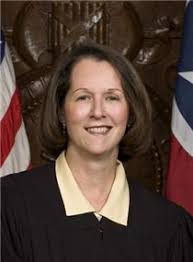Tennessee voters concerned about in-person voting during the COVID-19 pandemic got half a loaf from the state Supreme Court. 
Justice Cornelia Clark
Not quite half, actually. In fact, not even close. In its ruling Wednesday on the state’s appeal of a Nashville chancellor’s ruling guaranteeing universal mail-in voting (technically, no-excuse absentee voting) through the run of the pandemic, the Court decided that such a blanket permission would apply only to this week’s election contests, not to those in November.
And, of course, November — when a President is chosen, along with a U.S. Senator and members of the state legislature — is the big enchilada, or the better part of it.
Left unsettled and perilously close to moot was the central issue: To what extent should the looming danger of COVID-19 give any individual voter license to apply for an absentee ballot?
Until the hearing of the appeal before the Supreme Court, the position of state government had been clear: As enunciated both by Governor Bill Lee and Secretary of State Tre Hargett, it was that fear of contracting COVID-19 or of its effects nor even potential vulnerability to the virus were not reasons allowed by Tennessee law for obtaining an absentee ballot.
That was the position taken as well by assistant Attorney General Alex Rieger when plaintiffs — including Memphians from the Up the Vote 901 group and others represented by the ACLU — first sought an injunction in June to permit universal mail-in voting.
Nashville Chancellor Ellen Hobbs Lyle, who heard that case, granted a temporary injunction in favor of the plaintiffs.
Last week, however, when the state Supreme Court heard the state’s appeal, another representative of the AG’s office, Janet Kleinfelter, appeared to argue that underlying medical circumstances indicating potential vulnerability to COVID-19 would be proper grounds for a mail-in ballot, and, perhaps crucially, that only a voter’s attestation to such circumstances would be required.
That arguably left the issue, and any mandate concerning it, in something of a muddle. In any case, Justice Cornelia Clark, writing for a four-Justice majority of the Court, wrote in her opinion, “We hold that injunctive relief is not necessary with respect to such plaintiffs and persons.”
The opinion further left it incumbent upon the state to ensure that “appropriate guidance, consistent with the state’s acknowledged interpretation, is provided to Tennessee registered voters with respect to eligibility of such persons to vote absentee by mail in advance of the November 2020 election.”
This “nothing-to-see-here” ruling is against a background of the state’s having had to be prodded multiple times by Chancellor Lyle to adjust its actions and public announcements to the spirit and letter of her injunction.
Technically, the Supreme Court’s ruling is a vacation of Lyle’s injunction and a remand of the case back to the Chancellor’s court. It leaves the plaintiffs with recourse to seek further action if they choose.
The High Court’s action was somewhat foreshadowed during last week’s hearing in the questioning of attorneys. For example, a point was raised by Justice Clark about the time frame of Chancellor Lyle’s injunction, whether it was meant to expire after August or after November or just when.
That calendar point, which was not resolved in the hearing itself, seems to have been dealt with in the ruling and it may partly explain the reasoning of Justice Clark, from whom, along with Justice Sharon Lee and possibly Justice Roger Page, plaintiffs had hoped for a favorable ruling.
Two other Justices, Holly Kirby and Chief Justice Jeffrey Bivins, were expected to lean toward the state’s arguments, based on their questioning during the hearing as well as their more conservative profiles on the Court.
University of Memphis law professor and former County Commissioner Steve Muroy, an attorney for the Up the Vote 901 group, was philosophical about Wednesday’s ruling: “This is a partial victory. We got 100% absentee choice for August . While we’re disappointed we didn’t get the same for November, and disagree with that part of the decision, we did get choice for all voters with an underlying medical condition or caretakers thereof. That’s likely a substantial majority of voters.”